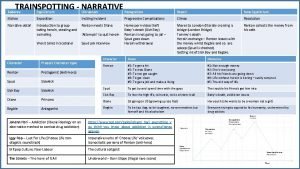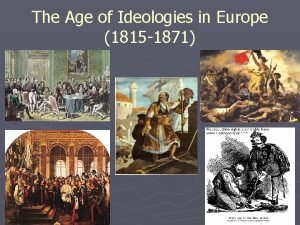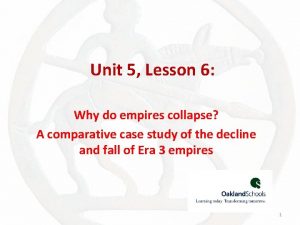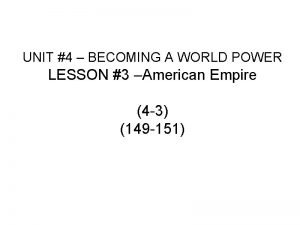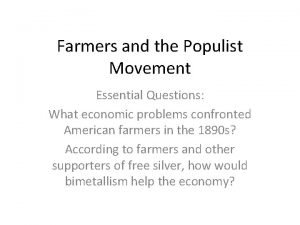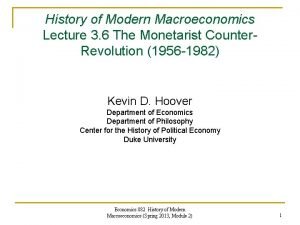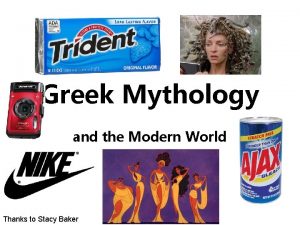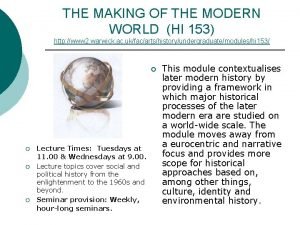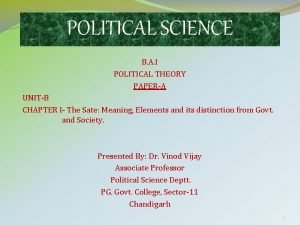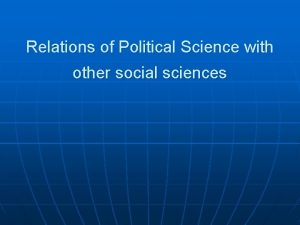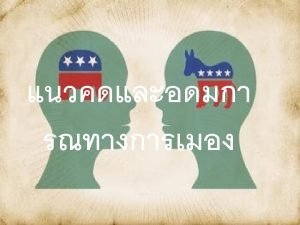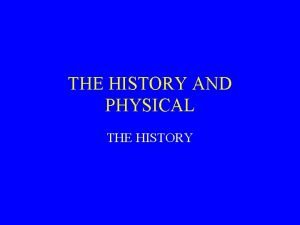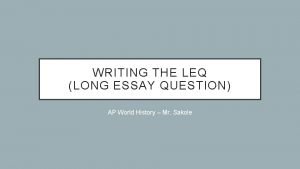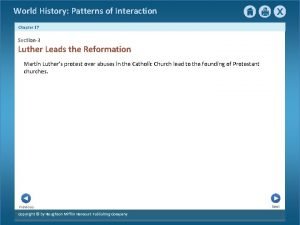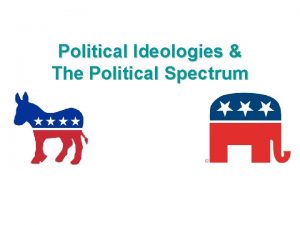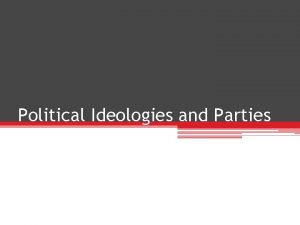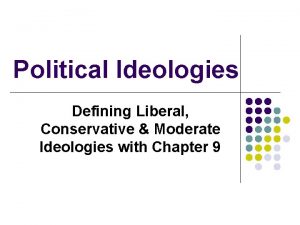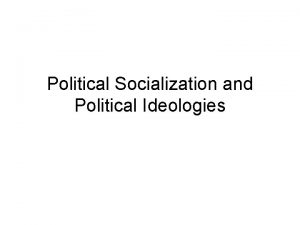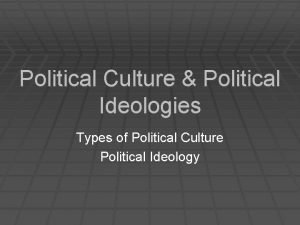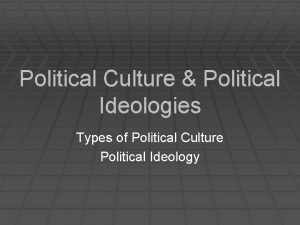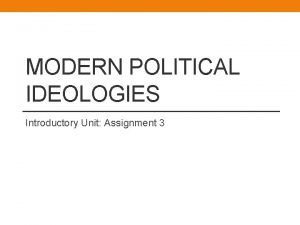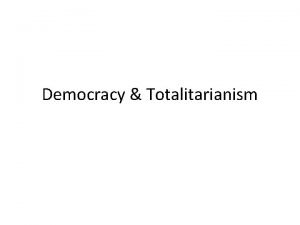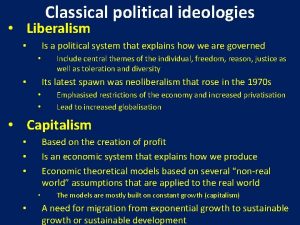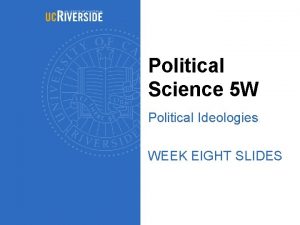Modern World History Unit 9 Political Ideologies Political
















































- Slides: 48

Modern World History Unit 9 Political Ideologies

Political Ideologies Challenge the Conservative Order A) Western Europe 1800 s • Influenced by Enlightenment, American, and French Revolutions • Moving towards industrialization and a commerce based economies • Nation–states were more responsive to their citizens • Became economic powerhouse in Europe

Political Ideologies Challenge the Conservative Order B) Eastern Europe 1800 s • Low literacy rates many were unaware of Enlightenment ideas • Agrarian economies (Pro farming) • Absolute monarchs controlled a small group of nobles, and large populations of peasants and serfs

Political Ideologies Challenge the Conservative Order C) Political ideologies of the 1800 s 1. Conservatives • Wanted little change in power structure (already had the power) • Nobles, large landowners, monarchs and clergy who traditionally held power

Political Ideologies Challenge the Conservative Order C) Political Ideologies of the 1800 s 2. Liberals • Wanted power for elected legislators • Middle-class merchants and business people • Wanted to limit voting rights to people who were educated and owned property

Political Ideologies Challenge the Conservative Order C) Political Ideologies of the 1800 s 3. Radicals • Wanted the end of rule by kings • Full voting rights for all people, even the poor

Political Ideologies Challenge the Conservative Order C) Political Ideologies of the 1800 s 4. Nationalists • Wanted people with a common language and culture to have their own government and territory

Political Ideologies Challenge the Conservative Order D) Movements for Individual Rights 1. Abolition • Movement to end the slave trade • British parliament made slave trade illegal in 1807 • Used British navy to enforce the policy in British colonies

Political Ideologies Challenge the Conservative Order D) Movements for Individual Rights 2. Expansion of the Right to Vote (Britain) • Only men who owned property could vote for members of Parliament • Middle-class protested (supported liberal ideology)

Political Ideologies Challenge the Conservative Order D) Movements for Individual Rights 2. Expansion of the Right to Vote (Britain) • Parliament passed the Reform Bill of 1832 which gave many in the middleclass the right to vote and gave seats in Parliament to the new industrial cities • 1844 most adult males could vote

Political Ideologies Challenge the Conservative Order D) Movements for Individual Rights 3. Women’s Suffrage (women’s right to vote) • 1890 male citizens could vote in most industrialized countries

Political Ideologies Challenge the Conservative Order Women’s Social and Political Union (1903) • More radical group • Held rallies and parades • Disrupted gov’t speeches • Set buildings on fire • Went on hunger strikes when arrested • Gained the right to vote after WWI in America and Britain

Serfdom in Russia • Russia still operated under a feudal system in the mid-1800 s • Czar was an absolute ruler • Nobles supported the czar and were large landowners • Serfs or peasants were bound to the land on which they worked (czar’s feared freeing them)

Alexander II Promotes Change • The Crimean War was Russia’s attempt to take control of the Black Sea from the Ottoman Empire • Blames Russia’s defeat on poor economy and lack of industrialization

Alexander II Promotes Change • Serfs are freed in 1861 • Nobles kept half the land • Peasants were in debt for having to pay for the other half of the land • Alexander II was assassinated in 1881 • Alexander III promoted industrialization and tight control over gov’t • STOP

Nationalist Movements 1. Successful nationalist movements Greece • 1821 revolted against Ottoman Empire • 1827 European nations helped the Greeks (religious conflict, political conflict) • 1830 Greeks won independence

Nationalist Movements Belgium • 1830 declared independence for the Dutch

Nationalist Movements 2. Unsuccessful nationalist movements Poland • 1830 rebels against Russia • Rebellion put down forcefully by conservative governments

Nationalist Movements 2. Unsuccessful nationalist movements Hungarians and Czechs • 1848 rebel against Austria • Conservative governments stop rebellion

Nationalist Movements 2. Unsuccessful nationalist movements France • 1830 riots force king to flee (more liberal king replaces him • 1848 new revolt overthrows the king • Radicals looking for social and economic reforms

Nationalist Movements France • Radicals promote violence • New government is created with a legislature and strong president

Nationalist Movements France • Louis-Napoleon (Napoleon Bonaparte’s nephew) becomes president • Later takes the title emperor • Builds railroads and promotes industrial growth

American Civil War American expansion early 1800 s • Louisiana Purchase from France • South west territory from Mexico • Expansion pushed natives off their land (leading to questions of rights)

American Civil War American South • Plantation economy (agricultural system using slave labor) • Southern states supported states rights over federal power • Southerners wanted to keep slavery and extend it into new territories

American Civil War 1861 -1865 • Southern forces fired on Ft. Sumter to start the war • Southern economy was devastated • American industry grows

American Civil War • Emancipation Proclamation issued by President Lincoln prohibited slavery in states that rebelled (cannot be enforced) – 1863 • Constitutional amendments end slavery and grants citizenship to former slaves – 13 th- ended slavery – 14 th- rights to former slaves – 15 th- right to vote former slaves • African Americans have limited rights until the Civil Rights laws of the 1960 s

Abolitionists Great Britian • British Parliamant made slave trade illegal in the 1800’s • This assisted the abolitionist movement going on in America

Unification Movements Italy (steps to unification) • Northern Italy was unified under the leadership of Count Cavour the chief minister of the Kingdom of Piedmont -Sardinia • Southern Italy was unified under Giuseppe Garibaldi

Unification Movements Italy • North and South would be united under the king • Venice is added in 1866

Unification Movements Germany (early 19 th century) • Was divided into several city-states • Austria and Prussia competed for control • 1815 creation of the German Confederation (Austria and Prussia were most powerful)

Unification Movements Germany • 1850 new German Confederation is created without Austria • Prussia dominates • 1860 s Otto von Bismarck (Prussian Chancellor) oversaw the growth of the Prussian military and industry

Unification Movements Germany • Prussia allied with Austria to secure territory in north • Prussia turned against Austria to gain territory in the south • Prussia started a war with France to increase German nationalism in states that had not yet united with Prussia

Unification Movements Germany • 1871 Germany is unified under the Prussian King (Kaiser)

Balance of Power in Europe • England Germany are the strongest industrially/economically • France has a weak government and fair economy • Austria, Russia, and Italy have weak economies and are under industrialized (politically struggle to control their people)

Political Ideology Quiz You need a sheet of paper and a pen/pencil 1) Which section of Europe is turning into an economic powerhouse (Eastern or Western Europe) in the 18 th century? 2) Why? (what is assisting them in becoming so prosperous/rich…what do they have that the other half did not? ) 3) Which section of Europe is turning into an agriculture/agrarian based region (Eastern or Western Europe)? 4) Who did the conservatives want to stay in power? 5) Why? 6) Who did the liberals want to put in power (so they would have a sayso in government)? 7) What did the radicals want and what did the nationalists want? 8) What was the purpose of the abolition movement in the early to mid 1800’s? 9) What was the women’s battle for voting rights referred to as? 10) List two things that women did (in protest) to be seen and heard when it came to their voting rights?

Political and Economic Ideologies The Industrial Revolution led philosophers and economists to new ways of thinking about the economic and social structure of society, leading to changes in political systems in many areas.

Capitalism • Based on private ownership of the means of production and creation of goods and services • Goods and services provide profit or income for individuals or corporations • Example: USA

Capitalism Adam Smith • Eliminating limits on business and trade helps a nation’s economy grow • Laissez-faire government keeps its “hands off’ the economy • Capitalism provides the greatest benefit for society

Socialism • Socialism does not protect the working class (gives too much power to business owners) • Believe government should do away with policies that lead to economic disparity between the rich and poor • Positive Aspect: a more equal society

Socialism • Business should be owned by society as a whole, not by individuals • This keeps a small group from becoming wealthy at the expense of a larger group • State redistributes the wealth of society in an equitable way according to the groups in charge • Examples: Sweden and Canada

Communism • Marxism is a radical form of socialism in which all production is owned by the public • Karl Marx wrote the Communist Manifesto • No one should own private property and products and profits are evenly distributed to all members of society

Communism Communist Manifesto • Believed factory owners and workers oppose each other over a struggle for power • No private property • Factors of production are owned by the public, products and profit are distributed evenly to all members of society • Example: Cuba

Failures of Communism • All members of society must be in agreement with the arrangement and uphold the established regulations • Negative Aspect: Corruption in government of communist states as leaders take favors or currency in exchange for special treatment

Communism Essential Knowledge • Explain the differences between socialism and communism. • Explain how the concepts of socialism and communism emerged as a reaction to the negative aspects of the Industrial revolution.

Anarchism • Develops in response to harsh reactions of governments following the revolutions of 1848 (government repression of working classes) • Theory that all forms of government are oppressive and undesirable and should be abolished

Anarchism Problems with anarchism: • How can individual freedom be protected without an organized government? • Without an organized system of law people are left to the mercy of the criminal and powerful elements of society. • Who will provide the national security and protect the freedoms of the people?

Conclusion • While philosophers discussed theories…workers formed unions to protect their rights and interests.

Essential Knowledge • What are the positive and negative aspects of capitalism, socialism, communism, and anarchism? STOP
 Political ideology definition ap gov
Political ideology definition ap gov Two dimensions of political ideologies
Two dimensions of political ideologies Political ideologies cows
Political ideologies cows History gcse spec
History gcse spec Democratic socialism
Democratic socialism Ideologies examples
Ideologies examples Social studies 30-2 textbook
Social studies 30-2 textbook Ideologies examples
Ideologies examples Curriculum ideologies
Curriculum ideologies An age of ideologies
An age of ideologies Primogenity
Primogenity Elements of marxism
Elements of marxism Chechynia
Chechynia An age of ideologies
An age of ideologies Ap world history chapter 25 africa and the atlantic world
Ap world history chapter 25 africa and the atlantic world Countries michael jackson visited
Countries michael jackson visited Unit 5: lesson 6 - review questions
Unit 5: lesson 6 - review questions World history unit 4 lesson 3
World history unit 4 lesson 3 Unit 6 review questions
Unit 6 review questions What economic reforms did the populist party call for?
What economic reforms did the populist party call for? History of sugar timeline
History of sugar timeline Oliver dance
Oliver dance Roman floral history
Roman floral history Baroque floral design history
Baroque floral design history Early american floral design history
Early american floral design history Modern history
Modern history Modern history
Modern history History of modern portfolio theory
History of modern portfolio theory Modern medicine in ethiopia
Modern medicine in ethiopia Challenges of being a disciple in the modern world
Challenges of being a disciple in the modern world Print culture and the modern world
Print culture and the modern world Language of mathematics
Language of mathematics Greek mythology in the modern world
Greek mythology in the modern world @en123
@en123 Print culture examples
Print culture examples Psyche et eros
Psyche et eros Making of the modern world warwick
Making of the modern world warwick Modern world
Modern world Relation between political science and psychology
Relation between political science and psychology Relationship of political science with economics
Relationship of political science with economics Plenty for beautification political cartoon
Plenty for beautification political cartoon Sistemas democraticos
Sistemas democraticos Unit 7 modern ga and civil rights
Unit 7 modern ga and civil rights Also history physical
Also history physical Writing an leq
Writing an leq Total war world history definition
Total war world history definition Chapter 17 section 3 world history
Chapter 17 section 3 world history World history spring final exam review answers
World history spring final exam review answers Ap world history jeopardy
Ap world history jeopardy




